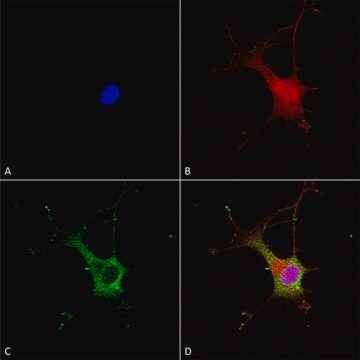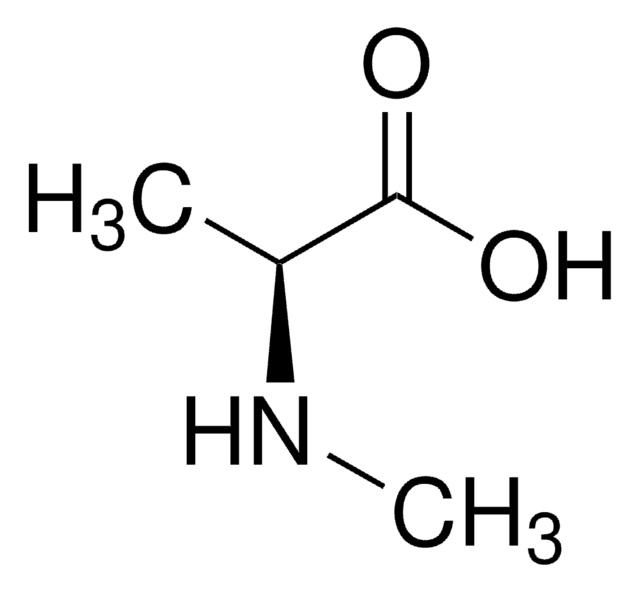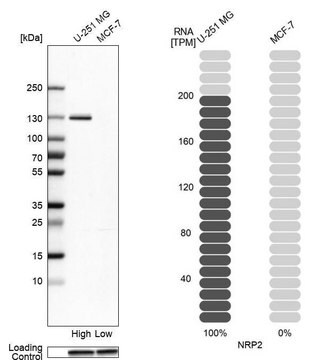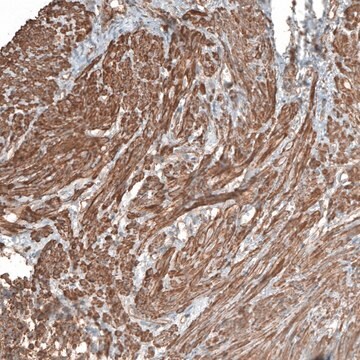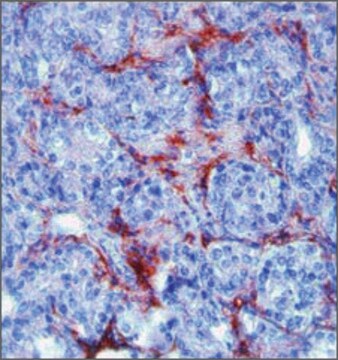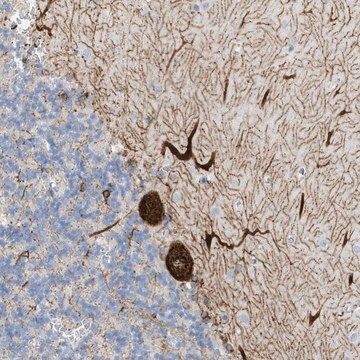추천 제품
생물학적 소스
rabbit
Quality Level
항체 형태
affinity isolated antibody
항체 생산 유형
primary antibodies
클론
polyclonal
정제법
affinity chromatography
종 반응성
human, mouse, rat
기술
immunohistochemistry: suitable
western blot: suitable
NCBI 수납 번호
UniProt 수납 번호
배송 상태
wet ice
타겟 번역 후 변형
unmodified
유전자 정보
human ... MGLL(11343)
일반 설명
Monoglyceride lipase (MGL), or alternatively HU-K5, Lysophospholipase homolog, Lysophospholipase-like, or Monoacylglycerol lipase (MAGL) is a protein encoded by the MGLL gene in humans and is very important in lipid metabolism. Monoglyceride lipase is the enzyme that converts monoacylglycerides (key building blocks of lipids) into free fatty acid chains and glycerol. Also, Monoglyceride Lipase hydrolyzes endocannabinoids which ultimately can regulate nociperception and the perception of pain, so the enzyme is being studied in pain mediation therapies. Monoglyceride Lipase is expressed in many tissues including fat, lung, liver, brain and heart. In disease, Monoglyceride Lipase is being studied most intensely in cancer research. In some cancers it appears to be play a suppressive role in regulating AKT mediated signaling, but in others, since the enzyme regulates the levels of fatty acids that can serve as intra and intercellular signaling molecules, Monoglyceride lipase activity seems to promote cancer cell migration, invasion and growth.
면역원
Recombinant protein corresponding to mouse MAGL.
애플리케이션
Immunohistochemistry Analysis: A 1:50 dilution from a representative lot detected MAGL in human cerebral cortex tissue.
Immunohistochemistry Analysis: A representative lot detected MAGL in human hippocampus tissue (Mulder, J., et al. (2011). Brain. 134:1041-1060).
Immunohistochemistry Analysis: A representative lot detected MAGL in human hippocampus tissue (Mulder, J., et al. (2011). Brain. 134:1041-1060).
Research Category
Neuroscience
Neuroscience
Research Sub Category
Developmental Signaling
Developmental Signaling
This Anti-MAGL Antibody is validated for use in Western Blotting and Immunohistochemistry for the detection of MAGL.
품질
Evaluated by Western Blotting in mouse brain tissue lysate.
Western Blotting Analysis: 0.5 µg/mL of this antibody detected MAGL in 10 µg of mouse brain tissue lysate.
Western Blotting Analysis: 0.5 µg/mL of this antibody detected MAGL in 10 µg of mouse brain tissue lysate.
표적 설명
~ 31/33 kDa observed. This protein can be alternatively spliced, so western blots may show a doublet. Evidence for alternative splicing of MAGL, can run as doublet, ~31 and ~33 kDa
물리적 형태
Affinity purified
Purified rabbit polyclonal in buffer containing 0.1 M Tris-Glycine (pH 7.4), 150 mM NaCl with 0.05% sodium azide.
저장 및 안정성
Stable for 1 year at 2-8°C from date of receipt.
기타 정보
Concentration: Please refer to lot specific datasheet.
면책조항
Unless otherwise stated in our catalog or other company documentation accompanying the product(s), our products are intended for research use only and are not to be used for any other purpose, which includes but is not limited to, unauthorized commercial uses, in vitro diagnostic uses, ex vivo or in vivo therapeutic uses or any type of consumption or application to humans or animals.
적합한 제품을 찾을 수 없으신가요?
당사의 제품 선택기 도구.을(를) 시도해 보세요.
Storage Class Code
12 - Non Combustible Liquids
WGK
WGK 1
Flash Point (°F)
Not applicable
Flash Point (°C)
Not applicable
시험 성적서(COA)
제품의 로트/배치 번호를 입력하여 시험 성적서(COA)을 검색하십시오. 로트 및 배치 번호는 제품 라벨에 있는 ‘로트’ 또는 ‘배치’라는 용어 뒤에서 찾을 수 있습니다.
Ryan D Shepard et al.
Frontiers in synaptic neuroscience, 13, 689518-689518 (2021-06-15)
Adverse events and childhood trauma increase the susceptibility towards developing psychiatric disorders (substance use disorder, anxiety, depression, etc.) in adulthood. Although there are treatment strategies that have utility in combating these psychiatric disorders, little attention is placed on how to
Ping-Yuan Wang et al.
Cancer prevention research (Philadelphia, Pa.), 14(1), 31-40 (2020-09-23)
Germline mutations of TP53, which cause the cancer predisposition disorder Li-Fraumeni syndrome (LFS), can increase mitochondrial activity as well as fatty acid β-oxidation (FAO) in mice. Increased fatty acid metabolism can promote cancer malignancy, but its specific contribution to tumorigenesis
자사의 과학자팀은 생명 과학, 재료 과학, 화학 합성, 크로마토그래피, 분석 및 기타 많은 영역을 포함한 모든 과학 분야에 경험이 있습니다..
고객지원팀으로 연락바랍니다.